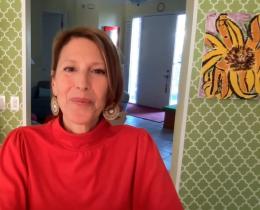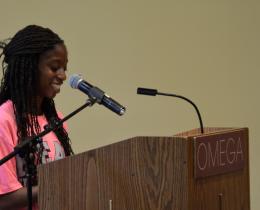Attending Lynda Barry's Writing the Unthinkable workshop was a dream come true for Melissa Burgess, and one that wouldn’t have been possible without an Omega scholarship.
When Melissa applied for the scholarship, she was a graduate student and did not have the financial means to attend Omega.
At the time, Melissa was studying contemporary women’s life writing and earning her doctorate in English from Saint Louis University, where she now holds a staff position.
“I am so thankful I was awarded the scholarship because it allowed me to have this life-changing experience with Lynda, an experience I eventually wrote about and turned into a book chapter for the forthcoming collection, Lynda Barry: Seriously Multitalented.”
Attending the workshop gave Melissa the opportunity to experience Lynda's teaching methods and playful pedagogy in action.
“I was so inspired by her process of helping students bring images forward from the back of their minds and transmit them to others through writing and drawing. Working with Lynda helped build my confidence and encouraged me to take risks and experiment with my writing and creative processes,” she said. “She already was one of my heroes and getting to work with her so closely made me love her even more.”
Experiencing A Breakthrough Moment
Melissa says the experience was nothing short of life changing. Her most memorable moment came on the third day when she was chosen to read one of her stories out loud in front of the class.
“I’ve always been someone who does not speak up much in large groups,” Melissa said. “I usually never want to be the center of attention, but I felt so comfortable with Lynda and with my classmates that when she asked for readers, my hand shot up quickly before I could doubt myself.”
Melissa said that Lynda ran across the classroom and knelt down next to her as she began to read.
“I had written a story about one of my childhood best friends, and the process of writing it allowed me to access feelings and memories that I hadn’t thought about in decades—images I didn’t know were still somewhere inside of me,” she said. “It was as if the story was flooding out of me, and I didn’t have time to stop and question what I was creating.”
As she was reading, she started crying at a particularly troublesome part, and she could hear others around the room crying, too.
“To know that my story, that these images that I had created only minutes before, could impact others so strongly and with such immediacy completely blew me away,” she recalled.
When she finished reading, Lynda simply looked up at her and said, with complete sincerity and kindness, “Good. Good. Good.”
“I felt so proud of myself for my bravery and for allowing myself to be vulnerable, and I was so thankful I had opened up enough to let a moment like that happen,” she said.
Building More Confidence
Along with the financial support, Melissa said being awarded the scholarship boosted her confidence, too.
“Even three years later, the experience of working with Lynda has continued to help me as a writer and has made me more confident as a person,” she said.
Melissa relied on the strategies she learned in Lynda’s workshop as she was finishing her dissertation and preparing for her defense. (Lynda Barry’s graphic memoir, One! Hundred! Demons!, was the subject of one of the chapters of her dissertation.) She said the methods helped her to let go of some of the fear she had long associated with writing, and with academic writing in particular.
“I even used some writing prompt flashcards she gave me during an after-class, one-on-one conversation (tiny pieces of paper that are now some of my most prized possessions) to help generate ideas and get my writing flowing when I felt stuck or overwhelmed with fear,” she said.
Melissa continues to use the practices she learned in Writing the Unthinkable to guide her work with the undergraduate students she now supervises at her university.
She is responsible for training a large staff of peer tutors, and she hopes to use some of her pedagogical methods to help them experience new ways of thinking and creating that they can then use in their own tutoring sessions with students.
On a personal level, she also continues to identify as a writer.
“My experience of working with Lynda still gives me the push I need to proudly believe that my voice is valuable and that what I can create deserves to be shared with others,” she said.



